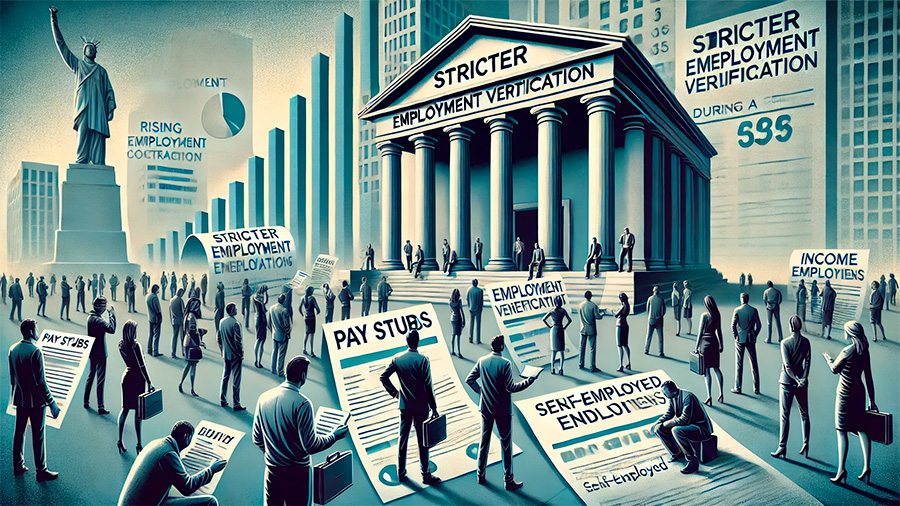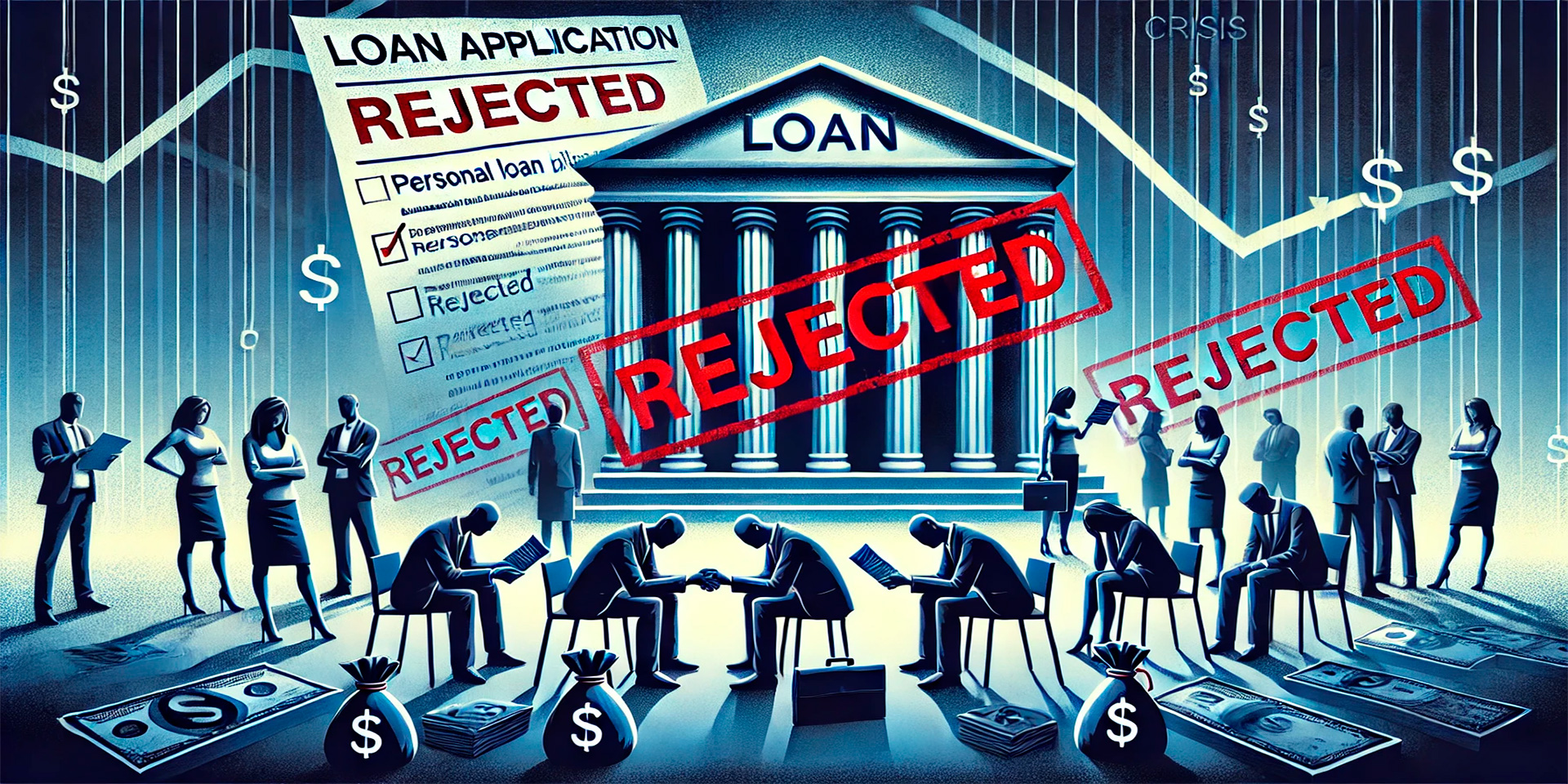Economic crises have far-reaching consequences on both individuals and financial institutions, and one of the most significant impacts is on personal loan approval rates. During times of economic instability, lenders become more cautious, leading to stricter lending criteria and higher rejection rates for personal loans. Understanding how economic downturns influence lenders’ decisions can help consumers navigate the loan application process more effectively and avoid unnecessary rejections.
In times of crisis, factors such as increased unemployment, falling incomes, and uncertain market conditions make it riskier for lenders to approve loans. As a result, borrowers may find it more challenging to access credit, even if they have a good credit score or a stable income. Let’s explore the reasons behind rising loan rejection rates during economic crises and what borrowers can do to improve their chances of loan approval.
Why Lenders Tighten Loan Approval Criteria During Crises
During an economic crisis, lenders face heightened risks due to the potential for widespread financial instability. Economic downturns often lead to higher unemployment rates, reduced consumer spending, and increased default rates on loans. As a result, lenders become more risk-averse, tightening their loan approval criteria to mitigate the risk of loan defaults.
Lenders typically assess a borrower’s ability to repay a loan by evaluating factors such as income, credit score, debt-to-income ratio, and employment history. During a crisis, however, lenders may place greater emphasis on these factors, setting higher thresholds for approval. For example, borrowers with borderline credit scores may find it more difficult to get approved, while those with high debt loads or unstable employment may be rejected outright.
Increased Risk of Default
The risk of loan defaults rises significantly during economic crises. Unemployment spikes, businesses close, and many individuals experience a reduction in income. Lenders anticipate that more borrowers may struggle to meet their loan obligations under these circumstances, which leads them to tighten lending standards. They may require higher credit scores, lower debt-to-income ratios, or more extensive proof of stable income to reduce the likelihood of defaults.
Lower Consumer Confidence
Economic crises also affect consumer confidence, leading to reduced spending and borrowing. When consumers are uncertain about the future, they may be less likely to take out personal loans for discretionary spending. Lenders, in turn, see lower demand for loans but also face the challenge of identifying which borrowers present the lowest risk. To protect themselves from losses, lenders raise their approval standards and scrutinize applications more closely.

How Credit Scores Are Affected During Crises
A borrower’s credit score plays a significant role in personal loan approval decisions, and economic crises can negatively impact credit scores for many individuals. Missed payments, reduced incomes, and increased reliance on credit can all contribute to declining credit scores during times of economic instability. A lower credit score makes it more difficult to qualify for a personal loan and may lead to higher interest rates for those who do get approved.
For many borrowers, financial difficulties during a crisis may lead to delayed payments on existing loans, credit cards, or other obligations, which can significantly damage their credit scores. Even individuals with previously strong credit may see their scores drop if they are forced to rely more heavily on credit or miss payments due to loss of income.
Impact of Missed Payments
One of the biggest risks to a borrower’s credit score during an economic crisis is the possibility of missed payments. Whether it’s due to job loss, reduced working hours, or increased expenses, missing payments on credit cards, mortgages, or existing loans can lead to a significant drop in credit scores. Since lenders prioritize applicants with strong credit histories, borrowers with recent missed payments are more likely to be denied a personal loan during a crisis.
Increased Credit Utilization
Credit utilization—the amount of available credit a borrower is using—can also rise during an economic crisis as individuals rely more on credit cards or lines of credit to cover essential expenses. Higher credit utilization can negatively impact credit scores, making it harder to get approved for new loans. Lenders view high credit utilization as a sign of financial strain, which increases the perceived risk of lending to that borrower.
Changes in Debt-to-Income Ratios
Another key factor that lenders assess when approving personal loans is the borrower’s debt-to-income (DTI) ratio. The DTI ratio measures the percentage of a borrower’s monthly income that goes toward debt payments. A high DTI ratio signals that the borrower may have difficulty managing additional debt, making lenders more cautious about approving new loans.
During an economic crisis, borrowers may experience a reduction in income due to job loss or reduced working hours, which increases their DTI ratio. Even if the borrower’s existing debt levels remain the same, a drop in income can make their financial situation appear riskier to lenders. In response, lenders may set stricter DTI ratio limits or reject applicants with ratios that would have been acceptable before the crisis.
Income Volatility and Loan Rejection
Income volatility is a common issue during economic crises, as many workers face reduced hours, furloughs, or layoffs. For self-employed individuals or those in industries affected by the crisis, income may become highly unpredictable. Lenders are less likely to approve loans for borrowers with volatile income streams, as it becomes harder to assess their ability to repay the loan consistently. Borrowers with variable incomes may need to provide additional documentation, such as tax returns or bank statements, to prove their financial stability.
Rising Debt Levels During Crises
As borrowers take on more debt during a crisis to cover living expenses, their DTI ratios may increase, further reducing their chances of loan approval. Lenders become wary of approving loans for borrowers who are already carrying significant debt, as they may struggle to manage additional loan payments. Borrowers should aim to reduce their debt levels or avoid taking on new debt before applying for a loan to improve their chances of approval.

Stricter Employment Verification and Income Requirements
In times of economic stability, lenders often rely on recent pay stubs or employment history to verify a borrower’s income. However, during a crisis, lenders may adopt stricter employment verification processes to ensure that applicants have stable, reliable sources of income. This is especially true when unemployment rates rise, as lenders become more concerned about job stability.
Lenders may require additional proof of income, such as multiple pay stubs, employment contracts, or even letters from employers confirming that the borrower’s job is secure. For borrowers with variable or self-employment income, providing proof of long-term income stability can be more challenging, which may lead to a higher likelihood of loan rejection.
Unemployment and Job Instability
High unemployment rates during a crisis can increase loan rejection rates, as lenders view unemployed borrowers or those in unstable job positions as high risk. Even if a borrower has recently lost their job, lenders may hesitate to approve a loan, given the uncertainty of when or if the borrower will secure new employment. Borrowers who are concerned about job security may need to explore alternative financing options or apply for loans with less stringent approval criteria.
Self-Employed Borrowers Face More Scrutiny
Self-employed borrowers often face additional scrutiny during economic crises, as their income streams may be seen as more volatile compared to salaried workers. Lenders may require extensive financial documentation, such as tax returns or profit-and-loss statements, to verify the stability of self-employed income. Without a steady, verifiable income, self-employed borrowers may find it more difficult to qualify for personal loans during a crisis.
Limited Availability of Credit and Loan Products
During economic crises, lenders may limit the availability of certain loan products, making it harder for consumers to access personal loans. Banks and other financial institutions may reduce their lending activity to minimize risk, focusing only on the most creditworthy borrowers. Additionally, lenders may discontinue offering certain loan products, such as unsecured personal loans, or raise interest rates to offset the increased risk of lending during uncertain times.
Borrowers who are able to secure loans during a crisis may face higher interest rates or less favorable loan terms, as lenders adjust their offerings to reflect the increased risk of defaults. This limited availability of credit can make it difficult for individuals to access the funds they need, particularly if they are dealing with a financial emergency.
Higher Interest Rates and Tighter Loan Terms
Even when loans are approved during an economic crisis, borrowers may face higher interest rates and more restrictive loan terms. Lenders raise interest rates to compensate for the increased risk of defaults, which means that borrowing becomes more expensive. Additionally, lenders may offer shorter loan terms or require higher down payments to minimize their exposure to potential losses. Borrowers should carefully review loan terms before accepting an offer to ensure that the terms are manageable.
Reduced Loan Availability for High-Risk Borrowers
High-risk borrowers—those with poor credit, high debt levels, or unstable income—are more likely to be rejected for personal loans during a crisis. Lenders become highly selective, focusing on approving loans for borrowers with strong credit histories and low financial risk. For high-risk borrowers, this limited access to credit can make it challenging to cover essential expenses, forcing them to seek alternative forms of financing, such as payday loans or high-interest credit cards.
How Borrowers Can Improve Their Chances of Loan Approval
While loan approval rates often decline during economic crises, there are steps borrowers can take to improve their chances of being approved for a personal loan. By taking proactive measures to strengthen their financial profiles, borrowers can demonstrate their creditworthiness and reduce the perceived risk for lenders.
Improve Credit Scores
Maintaining or improving your credit score is one of the most effective ways to increase your chances of loan approval. Paying bills on time, reducing credit card balances, and avoiding new debt can help boost your credit score. Even small improvements in your credit score can make a difference in the eyes of lenders, especially during times of economic uncertainty.
Reduce Debt Levels
Lowering your debt-to-income ratio is another important step in improving your chances of loan approval. Paying down existing debts, such as credit cards or other loans, can demonstrate to lenders that you are managing your financial obligations responsibly. A lower DTI ratio signals to lenders that you have the capacity to take on additional debt without jeopardizing your financial stability.
Provide Comprehensive Documentation
During a crisis, lenders may require more documentation to verify income and employment. Be prepared to provide multiple pay stubs, tax returns, or other financial documents that demonstrate your income stability. Self-employed individuals should ensure they have up-to-date profit-and-loss statements and tax records to verify their income. Providing thorough and accurate documentation can help reassure lenders of your financial reliability.
Conclusion: Navigating Loan Approval During Economic Crises
Economic crises pose significant challenges for both borrowers and lenders, leading to higher rejection rates for personal loans. As lenders tighten their approval criteria and reduce the availability of certain loan products, consumers may find it more difficult to access credit when they need it most. However, by understanding the factors that influence loan approval rates during a crisis—such as credit scores, debt levels, and income stability—borrowers can take steps to improve their chances of securing a loan.
Strengthening your financial profile, reducing debt, and providing comprehensive documentation are key strategies for navigating the loan application process during times of economic instability. While the road to loan approval may be more challenging, proactive financial management can help borrowers successfully secure the funds they need.

